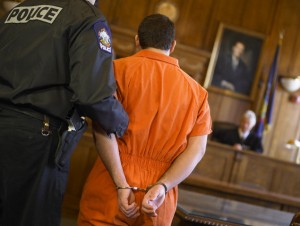The shakedown artistry of our criminal justice system
 Back in October, I wrote about the fact that one of my sister’s friends had been arrested for allegedly doing a very bad thing. I noted at the time that I had no idea whether or not he’d done the bad thing, but that it was apparent that the prosecutor’s office was setting it up so that he would go to jail whether he was guilty or innocent:
Back in October, I wrote about the fact that one of my sister’s friends had been arrested for allegedly doing a very bad thing. I noted at the time that I had no idea whether or not he’d done the bad thing, but that it was apparent that the prosecutor’s office was setting it up so that he would go to jail whether he was guilty or innocent:
The guy ended up being charged with 21 counts, many of them duplicative, and all of them carrying very high minimum sentences. He will almost certainly plea bargain.
If he’s guilty, a plea may be a good deal for him.
If he did what he is alleged to have done, but there are extenuating circumstances, that’s irrelevant in terms of deciding the risk of going to trial. The moment a jury concludes that he committed the acts, he’s done for. So again, a plea bargain is the way to go.
And then there’s the question of whether he’s innocent. By charging him with 21 acts, the prosecutor, by bringing 21 counts against him, has already sent a signal to the jury that this is a “bad” man. The legal presumption may be innocent until proven guilty, but a jury will almost certainly think “Boy, that’s a lot of smoke. How about if we just convict him on one of the charges?” The jurors won’t know, of course, that just one of those charges can mean decades in jail. So again, the best bet for the guy is to plead out.
So think about that for a moment — we have created a judicial system where a person, whether guilty, innocent, or with a good excuse, begs to go to jail rather than to face the stacked deck in court.
But there’s more to it than that: This system encourages lousy police work, because the police know that they probably won’t be called upon to answer for it before a judge and jury. Police are rational and they are overworked. Even the best and most decent of them will eventually fall down the slippery slope of dangerously careless policing.
I wrote about a single case. Glenn Reynolds has indicted the entire criminal justice system:
Here’s how things all-too-often work today: Law enforcement decides that a person is suspicious (or, possibly, just a political enemy). Upon investigation into every aspect of his/her life, they find possible violations of the law, often involving obscure, technical statutes that no one really knows. They then file a “kitchen-sink” indictment involving dozens, or even hundreds of charges, which the grand jury rubber stamps. The accused then must choose between a plea bargain, or the risk of a trial in which a jury might convict on one or two felony counts simply on a “where there’s smoke there must be fire” theory even if the evidence seems less than compelling.
This is why, in our current system, the vast majority of cases never go to trial, but end in plea bargains. And if being charged with a crime ultimately leads to a plea bargain, then it follows that the real action in the criminal justice system doesn’t happen at trial, as it does in most legal TV shows, but way before, at the time when prosecutors decide to bring charges. Because usually, once charges are brought, the defendant will wind up doing time for something.
The problem is that, although there’s lots of due process at trial — right to cross-examine, right to counsel, rules of evidence, and, of course, the jury itself, which the Framers of our Constitution thought the most important protection in criminal cases — there’s basically no due process at the stage when prosecutors decide to bring charges. Prosecutors who are out to “get” people have a free hand; prosecutors who want to give favored groups or individuals a pass have a free hand, too.
Please read Reynold’s entire article. It’s an important one, especially because we live in a time when it’s become impossible to know what the law is. Ours is not a society of “few rules but unbreakable.” Instead, it’s a society of “many rules, mostly unknowable.” If we get in the government’s cross hairs, the government can retrofit our seemingly innocent conduct to comport with some obscure rule or regulation . . . and then it nails us to the wall.
This is why the NSA spying is so terribly disturbing. Between an accessible database of every bit of information about us, and an unknowable arsenal of laws that almost certainly touch upon things that all of us do or have done, we have a police state without brakes.
When I posted Reynold’s article on Facebook, a friend of mine who served in the Navy JAG back in the early 1980s noted that, when he was a military prosecutor, he and his team were barred from talking about “my” case or, after a successful prosecution, from saying “I won” or some variant of that. The theory was that a prosecutor who became too personally invested in prosecution could essentially go rogue. That was a good rule. It doesn’t seem to apply anywhere any more, whether to military, federal, or state prosecutions.
